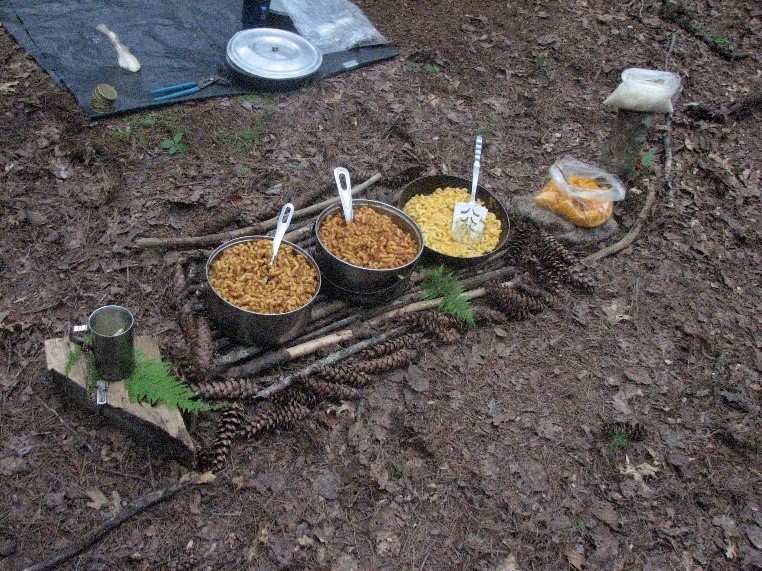Click to view our: history, educational approach, diversity statement and impacts and outcomes.
While you do not have to be a gifted athlete or in peak physical condition to attend an Outward Bound course, you do have to prepare for the challenges of Outward Bound.
There are two kinds of strength necessary to complete your course; physical and mental. Your body needs to be strong, but you must also come with an open mind, willing spirit and a cooperative attitude. Whether you paddle a canoe or kayak for six or eight hours, expedition with a 50+ pound pack through a steep mountain range or scale a rock wall, you will be pushed and rewarded on many levels.
Note to nicotine users: It's essential to quit before you arrive. Using your course as a means to quit nicotine is NOT recommended. You will be put in a number of stressful situations and a person suffering from nicotine withdrawal may not be able to effectively deal with those situations.
Note to caffeine users: If you drink caffeine, it is also essential to significantly reduce your level of consumption prior to your course start. Caffeine withdrawal may cause severe headaches which can hinder your progress on course.
MENTAL PREPARATION
Consider and be prepared for:
Teamwork: Be ready to be part of a team. Think about other team experiences you may have had in the past. Remember what helped your team be successful. Plan on being a positive contributor during your course.
Living with Less: Look around and think about what you have and what you truly need. Things we may take for granted like hot running water, upholstered furniture and sidewalks will not be part of your experience. When you get into the routines of wilderness living, you may notice that life in the wilderness and life at home are similar in that they are ultimately about food, clothing, shelter and the relationships you have with those around you. Because the wilderness lifestyle is simple, you will leave behind non-essentials like deodorant, make up, electronic devices and books.
Being Away from Home: Whether it is the first or the 20th time you have been away from home, you might not have been this “out of touch.” Don’t be surprised if you feel homesick at some point. Please use your instructors and teammates as resources for support.
Compassion: Compassion is a pillar on which Outward Bound was built. Compassion can be shown in kind, thoughtful actions and can be practiced during course through active listening and understanding of other perspectives. You may find that you need to make compromises as you support your team. It is always important to remember that your attitude and actions affect everyone.
Group Discussion: Your instructors will lead group discussions as you debrief each day. Through coaching from your instructors, your group will practice positive communication and conflict resolution techniques. These skills help your group maintain respect for individual opinions no matter how they may differ. Hopefully, these lessons will extend to your everyday life. Be prepared to share your perspective and gain insight from others during these discussions.
PHYSICAL PREPARATION
Have fun and enjoy the adventure of preparation while training for your course! This is an excellent opportunity for you to get outside, get fit and explore your neighborhood's parks and recreation areas.
Adopt Healthy Habits: A great way to physically prepare is to adopt healthy habits. Reduce consumption of fatty foods, excessive alcohol and caffeine as these substances require a lot of water and oxygen to metabolize. Eat plenty of unrefined carbohydrates (i.e. whole grains). Drink water regularly instead of juice or soda. If you drink or use tobacco or tobacco products, it is essential to quit before you arrive. And last, but not least, arrive at course start well rested.
FITNESS AND TRAINING
• You do NOT have to be an athlete or highly-trained to attend an Outward Bound course.
• You DO have to be physically capable and active. Our courses are demanding. You will use your muscles in new and challenging ways.
• It takes strength and fitness to paddle a boat for six or eight hours a day, carry a 50+ pound pack for 5 miles or climb a rock wall. If you aren’t already involved in a fitness program, now is the time to start. Your efforts will pay off in enjoyment, comfort and fun.
> View our suggestions for building fitness, testing your heart rate and an eight week fitness plan.
PREPARATION FOR WATER ACTIVITIES
Endurance train at least three times a week on a rowing machine. If a rowing machine is not available, supplement with strength training three times a week by including sit-ups, pull-ups, push-ups or weight training that concentrates on your shoulders, stomach and back.
As always cardiovascular exercise like running, walking, swimming or riding a bike will get you heart pumping and set you up for success on course!
